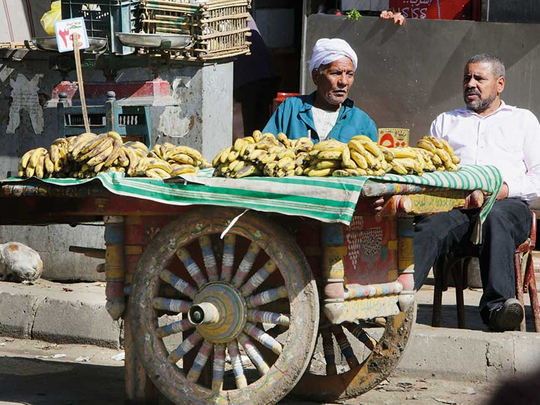
Cairo: For months now, vegetable vendor Mahmoud admits to have shunned main streets of the Egyptian capital while earning a living by selling his perishable wares.
With his donkey-drawn cart, he drives into narrow alleys, which are not frequented by municipal officials.
“If they catch me, they’ll confiscate my cart and donkey,” says the man in his thirties.
Mahmoud’s cart and the animal is the sole source of income for his family.
Late last year, the Cairo local authorities launched “Cairo Without Animal-Drawn Carts”, a plan aimed at making the populous city free of the wooden wagons.
The plan is based on encouraging owners of carts to abandon them in favour of acquiring motor vehicles including motorcycles and pick up trucks—depending on their business requirements.
The price of the vehicle is paid from selling the cart, while the remainder of the price is financed by soft loans repaid in long-term instalments.
The aim of the plan is to ease the flow of the traffic in Cairo and revamp the city’s image.
Animal-drawn carts are a decades-old feature of Cairo and other Egyptian areas.
They are used in transporting merchandise and collecting garbage from streets for recycling.
In working-class areas, they are sometimes used in ferrying people, although the motorised rickshaw, or the tuk-tuk, has become the main mode of transport in these areas in recent years.
Mahmoud says he does not require a motor vehicle for his line of work.
“I ride through the streets from the morning to the evening to earn a few pounds from selling some tomatoes, potatoes and cucumbers. I don’t need a motor vehicle for this and I cannot afford to pay for the cost of the petrol and maintenance,” he says.
In recent months, Egyptians have experienced a wave of hikes in prices of different goods and services as a result of the flotation of the local pounds and cuts in state subsidy on fuel.
The government has defended the measures as “unavoidable and overdue” economic reforms, pledging to expand the social protection network for the poor.
There are around 1,700 animal-drawn carts in Cairo, according to local authorities.
Nearly half of them have disappeared from the city’s streets in recent months either by confiscation or optional switch by their owners to motor vehicles, Cairo Governor Atef Abdul Hamid has said in media remarks.
The plan is supported by the Cairo Governorate, the governmental Fund for Social Development and the state –owned National Bank of Egypt.
As most drivers of such wagons are illiterate, Cairo authorities are holding free literacy courses for them to be qualified for applying to a driving licence.
Medhat Bekheet, who drives a horse-drawn cart selling kerosene, says he has not heard about the plan.
“Sometimes, municipality workers stop me when I go on major roads and insist I pay a fine for having no licence and obstructing the traffic,” says the 59-year-old man.
“I agree that animal carts should not use the main roads, which already suffer from heavy traffic. However, they should not be prohibited altogether because they do not cause pollution like the [motor] vehicles,” he argues.
“In addition, our carts have become part of the Egyptian legacy that should be preserved.”
In Bekheet’s opinion, the plan for replacing animal-drawn carts with motor vehicles will has only one advantage.
“It will stop people from calling us ‘arbagia’,” he says, using a plural of a disparaging local term referring to cart drivers. By and large, the term refers to ill-behaving people of a low social standing. “People keep calling us ‘arbagia’ although we are out on the street only to earn our living honestly.”
Cairo officials say they have met many owners of animal-drawn carts and discussed the plan with them.
“Most of them have welcomed the initiative after learning that it will help them increase their incomes and improve their social standards, “Deputy Cairo Governor Mohammad Ayman said.
He told semi-official newspaper Al Ahram that with the carts abandoned in favour of motor vehicles, the animals will be handed over to animal welfare associations to take care of them.
Ayman reassured the cart owners about the financial costs of switching to motor vehicles, saying they will get a support of 10,000 Egyptian pounds (Dh2,092) each from the Cairo authorities for buying a motorcycle.
“The bank cooperating in the project also offers the owner the option to pay the rest of the price in instalments over a long period at a very low interest rate,” he added.
“With all these facilities [in place], strict measures will be taken against driving carts again.”












